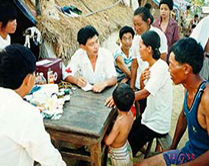 A new health care system is expected to help China's 900 million rural residents out of difficulties caused by unaffordable medical costs, top health official said.
A new health care system is expected to help China's 900 million rural residents out of difficulties caused by unaffordable medical costs, top health official said.
The system will also encourage villagers to stop avoiding health problems out of fear of high costs, said Li Changming, director-general of Department of Community Health and Maternal and Child Health at the Ministry of Health.
Named the Cooperative Medical Service, the system will be gradually implemented throughout the country by 2010, according to Li.
The Central Committee of the Communist Party of China (CPC) and the State Council recently released a document on health care in rural areas especially asserting governmental support to establish this system in counties, towns and villages.
The State will annually put 10 yuan (US$1.2) into each medical account of rural dwellers in the central and western regions beginning in 2003 to help setting up the system, which will cover partial medical costs.
"It is the first time the central government provide money to establish a medical insurance system for farmers since the founding of the People's Republic of China,'' Li said.
Meanwhile, local governments throughout the country are urged in the document to allocate an additional 10 yuan (US$1.2) or more per person annually to add to the funds.
Rural residents will be encouraged to join the system voluntarily, and each must also contribute 10 yuan (US$1.2) or more to join the system.
Uncovered by an effective health care system, rural residents, who account for more than 70 percent of the country's population, currently use only about 20 percent of China's medical service and resources.
The new system is expected to cover about 50 percent of medical costs.
Under the system, only serious health problems will be covered by the system, said Wang Lusheng, deputy director of China National Health Economics Institute.
However, different practices will be conducted in different areas due to the varied economic and social development levels.
In many developed coastal regions in East and Southeast China, both the local governments and residents can provide much more money than the required 10 yuan (US$1.2).
In contrast, in many areas of central and western China, it will be quite difficult for local governments and individuals to pay this sum, Wang noted.
As a developing country, many local governments are still plagued by a lack of funds, especially at the county and town levels.
The low incomes of farmers have also been a problem for the central government because it prevents the spread of health insurance systems in rural areas.
Official statistics show that there are still 30 million people without adequate food and clothing resources in China's rural areas.
"It sounds good, but I am afraid that both the town government and farmers will be reluctant to take even 10 yuan from their pockets,'' said Sun Jiqing, the Party head at Qiligou Village in Junan County of East China's Shandong Province.
The average per capital income of Sun's village of 800 this year is only about 300 yuan to 400 yuan(US$36 to US$48).
Under the new tax system, farmers in his village have to pay about 80 yuan (US$9.6) a year per mu (0.06 hectare) of land. Many families in his village will have no money left to join the system, Sun added.
However leaders say the system has been included in documents released by the central government and it will be carried out gradually, director-general Li Changming said.
Those who suffer from extreme poverty can also qualify for special allocations by the government and donations from charities to help them join the system, Li said.
The new system begins with pilot programs in certain regions and then will spread gradually, Li added.
So far, it has been successfully piloted in about 10 percent of rural areas in China, such as East China's Jiangsu Province and Southwest China's Tibet Autonomous Region, deputy director Wang Lusheng said.
During China's planned economy period, the health of rural people was guaranteed by an old cooperative medical care system at the village level which only provided basic medical services from grassroots doctors.
As the country moved to a market economy in early 1980s, the system was on the verge of collapse, mainly due to shrinking investment.
In 2000, 87.3 percent of the sick people in rural areas paid medical expenses completely by themselves, with 25 percent of them having to borrow money to pay the fee, Wang Longde, the country's vice-health minister, was quoted as saying recently.
More than 60 percent of patients have to leave hospital before recovery because they cannot continue to pay for the costs, Wang noted.
(China Daily November 21, 2002)
|

